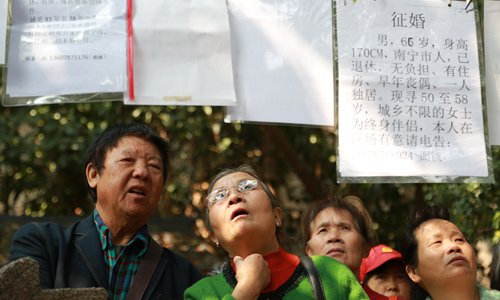Changing concepts of happiness give young Chinese little appetite for parental matchmaking
Global Times
1525815644000

Chinese parents put up personal information of their children to help them find partners at a matchmaking corner in Nanning in March. (Photo: IC)
Parks in Chinese metropolises have long been seen by pushy parents as perfect venues to hunt for a suitable spouse for their children who are too busy or slow to find love.
But young Chinese people now have "ever growing needs" and one of those is the need to avoid this kind of arranged marriage and choose their own partner. Many are now of the opinion that happiness cannot be found through formulaic descriptions of their personalities and qualities on a piece of laminated A4 paper.
At matchmaking corners in parks, parents usually display a resume of their child, listing education, birth date, salary, job, housing and any details that might "help" find a future spouse.
A permanent residence, house in a major city, overseas education or a car are seen as selling points, and parents of candidates blessed with such gifts tend to be much pickier.
Growing resistance
Guo Yingguang, 35, has been filming a matchmaking corner in a park in Shanghai for two years. Her multi-media documentary "The Bliss of Conformity" won the China Women Photographers Award at last year's Jimei and Arles International Photo Festival.
In her work, Guo, herself single, looks beneath the seemingly peaceful surface of the match-making corner, and finds young people highly resistant to the way their parents behave.
"I was told that I am good-looking, but a little old," she said.
"Many young people don't actually know that their parents are arranging blind dates for them in the park," Guo said. "It is like they are being put on public display. The parents are very anxious."
Match-making does produce some successful couples, but they can rarely be sure that the life they have chosen is the perfect one.
Fang Bin, in Shanghai, met his wife in 2010 on a blind date arranged by his parents. They are married now and raising a son. "I am lucky to find a wife of good temper, but we seldom have much freedom in choosing the way we live because we still count on our parents to pay our mortgage," Fang said.
Gu Huazeng, 65, found a spouse for her son at the park, but is reluctant to encourage others to follow suit. "It was more a matter of luck," she said.
"Even now, they still have some problems living together, and sometimes I ask myself 'Should I do everything for my son?' It's really hard to know," Gu said.
Changing ideas
Zhong Wei, who has been producing a blind date TV show called "Dating on Saturdays" for two decades, said that 70 percent of the 11,000 blind date participants they have followed are opposed to parents' interfering in their marriage.
"Marriage has become more complicated, as the idea of happiness in China is changing," said Zhang Zhenyu, a psychologist with the East China Normal University. "The older generation sees 'hardware' such as housing and salary as important factors, while the younger generation values 'software' like love and common interests."
"I'm not against marriage, but I am against quantifying happiness with material goods. It's not like you have to marry someone by a certain age or you'll be unhappy. People should be themselves and live the lives they want," said Guo, whose documentary won enormous support and got more than 20,000 comments on Weibo, China's microblogging platform.


